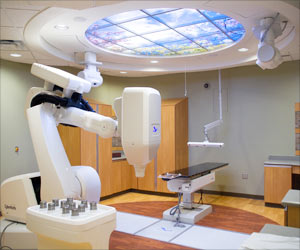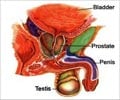The ‘sunshine vitamin’, vitamin D, is synthesized by the body when exposed to sunlight and is essential for bone health. This vitamin is necessary for the absorption of calcium and minerals from food. Recent advances in medical research, however, have found that vitamin D could play a key role in tumorigenesis.
Scientists Schwartz and Hulka, who first proposed that low level of vitamin D could increase the risk of prostate cancer, based their findings on the mortality rate of prostate cancer patients in America which was inversely proportional to their ultraviolet light exposure. Ultraviolet light from the sun is essential to convert the pro-hormone form of vitamin D present under the skin into vitamin D3 which is further treated in the liver and kidney to form the active hormone.- Higher concentrations of 25 hydroxyvitamin D was associated with decreased risk of prostate cancer
- Parathyroid hormone levels did not show any association with prostate cancer risk
- Vitamin D gene polymorphisms were not associated with prostate cancer risk
Such studies are significant in the treatment of prostate cancer as low degree prostate cancer patients are subjected to ‘active surveillance’ as stated by Bruce Hollis from the Medical University of South Carolina. This signifies monitoring the progress of the disease without active intervention like surgery or radiation, both of which might be too harsh for patients who are old. The patient is subjected to another biopsy a year later to understand the extent of progression, if any. Current research that supports the use of vitamin D in restricting the progression of prostate cancer would benefit such patients immensely. `
The study by Bruce Hollis and colleagues published in the Journal of Endocrinology and Metabolism (July 2012) studied the effect of 4000 I.U of vitamin D supplement in patients with low degree of prostate cancer. 52 patients were taken up for the study and vitamin D supplements at 4000 I.U per day was provided for a year and the level of serum prostate-specific antigen (PSA) and the degree of prostate cancer progression was analyzed. This study found that:
- There was no ill effect caused due to the administration of 4000 I.U/ day of vitamin D for a period of one year.
- There were no changes in the level of serum prostate-specific antigens
- 24 patients showed regression in the level of prostate cancer
Research into the effect of vitamin D on prostate cancer has revealed that the vitamin aids prostate cancer treatment in 2 ways:
- Anti-proliferative action: Vitamin D prevents the growth of prostatic epithelial cells by apoptosis (programmed cell death) and /or cell cycle arrest both in prostate cancer cell cultures as well as in prostate cancer cell lines.
- Anti-metastatic action: This is a hypothetic effect of vitamin D that finds scientific evidence in its ability to prevent adhesion and invasion of androgen-independent prostate cancer cell lines under laboratory conditions.
Dosage
Though daily consumption of vitamin D will prove to be more effective in the treatment of prostate cancer, its consumption should be restricted to once or twice a week, owing to ill effects of vitamin D toxicity in the body.Vitamin D Analog
New findings have encouraged researchers into finding equally effective analogs of vitamin D that promote tumorigenesis without toxicity at increased concentrations. Bauer and colleagues studied the effect of vitamin D analog 1α 24 dihydroxyvitamin D2 on human prostate cancer cell lines that were androgen sensitive. The results of the study showed that 1α 24 dihydroxyvitamin D2 has better anti-proliferative property than vitamin D, without toxicity at higher concentrations. The results have to be further assessed using studies on animal models but this study provides insight into the latest in scientific research and progress in the treatment and care of prostate cancer patients.Vitamin D For Bone Health Among Cancer Patients
Apart from the tumorigenic effects of vitamin D, Silva Ottanelli highlights the significance of maintaining bone health in cancer patients using vitamin D in the paper titled ‘ Prevention and treatment of bone fragility in cancer patient’ published in Clinical Cases in Mineral and Bone Metabolism in May 2015.This paper states that treatment measures for cancer patients, especially breast cancer patients under estrogen deprivation therapy and prostate cancer patients under androgen deprivation therapy, increase risk of osteoporosis. This drastically increases the risk of fracture for such cancer patients warranting care. Supplementing with vitamin D decreases the risk for osteoporosis and subsequent risk of fracture, thereby safeguarding cancer patients from additional trauma.
People At High Risk Of Vitamin D Deficiency
Vitamin D has always been considered to be available in plenty as it is synthesized with the help of UV light from the sun. However, there are certain hindrances to its synthesis like:- Prolonged cloudy weather which restricts access to the sun’s rays
- Increased time spent indoors, this is especially common among senior citizens with restricted movements
- Ailing patients who are confined to hospitals or indoors
- Higher melanin content among certain human races resulting in reduced absorption of UV light. This is cited as the reason behind increased incidence of prostate cancer among African Americans.
References:
1. http://www.cancer.gov/about-cancer/causes-prevention/risk/diet/vitamin-d-fact-sheet2. http://www.harvardprostateknowledge.org/low-vitamin-d-tied-aggressive-prostate-cancer
4. Marshall DT, Savage SJ, Garret-Mayer E, Keane TE, Hollis BW, Horst RL, Ambrose LH, Kindy MS and Gattoni-Celli S; “ Vitamin D3 supplementation at 4000 International Units per day for one year results in a decrease of positive cores at repeat biopsy in subjects with low risk prostate cancer under active surveillance”, The Journal of Clinical Endocrinology and Metabolism, 2012 July
5. Deschasaux M, Souberbielle JC, Latino-Martel P, Sutton A, Charnaux N, Gallan P, Hercberg S, Le Clerc S, Kesse-Guyot E, Ezzedine K and Touvier M; “A Prospective study of plasma 25 Hydroxyvitamin D concentration and prostate cancer risk”; The British Journal of Nutrition, November 2015
6. Silva Ottanelli; “Prevention and Treatment of bone fragility in cancer patients”; Clinical cases in mineral and bone mineral density, 2015 Oct
Source-Medindia














